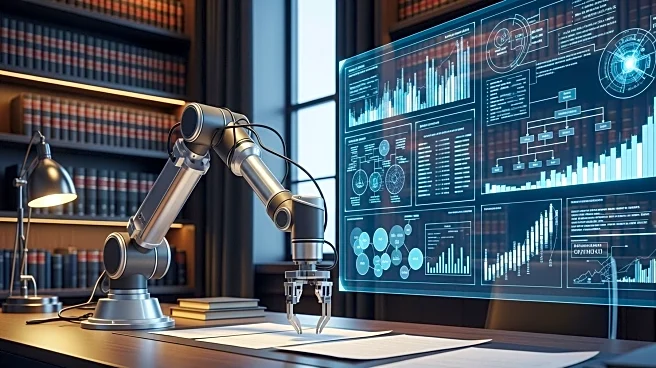What is the story about?
What's Happening?
Recent developments have highlighted the potential risks associated with the use of artificial intelligence in transactional legal work. While AI errors in litigation have been widely publicized, mistakes in transactional work, such as mergers and acquisitions (M&A), are less visible but potentially more damaging. The nature of transactional work means that errors can remain hidden until they cause significant issues, described as 'time bombs' by industry experts. This has raised concerns among legal professionals about the reliability and oversight of AI tools in complex legal processes.
Why It's Important?
The implications of AI missteps in transactional work are significant for the legal industry. As AI tools become more integrated into legal processes, the potential for unseen errors increases, which could lead to costly legal disputes or regulatory challenges. This situation underscores the need for robust oversight and quality control measures when deploying AI in legal settings. Legal firms and their clients could face substantial financial and reputational risks if AI errors are not promptly identified and addressed. The industry must balance the efficiency gains from AI with the potential for unforeseen consequences.
What's Next?
Legal professionals and firms are likely to increase scrutiny and implement more stringent checks on AI systems used in transactional work. There may be a push for developing industry standards and best practices to mitigate risks associated with AI. Additionally, firms might invest in training and hiring experts to oversee AI applications, ensuring that they align with legal standards and client expectations. The ongoing dialogue about AI in the legal sector will likely focus on enhancing transparency and accountability to prevent future mishaps.
Beyond the Headlines
The ethical and legal dimensions of AI use in transactional work are complex. As AI systems become more autonomous, questions about liability and accountability in case of errors will become more pressing. The legal industry may need to address these issues through new regulations or guidelines that define the responsibilities of AI developers and users. Furthermore, the cultural shift towards AI reliance in legal work could impact traditional practices and roles within the industry, prompting a reevaluation of how legal services are delivered.














